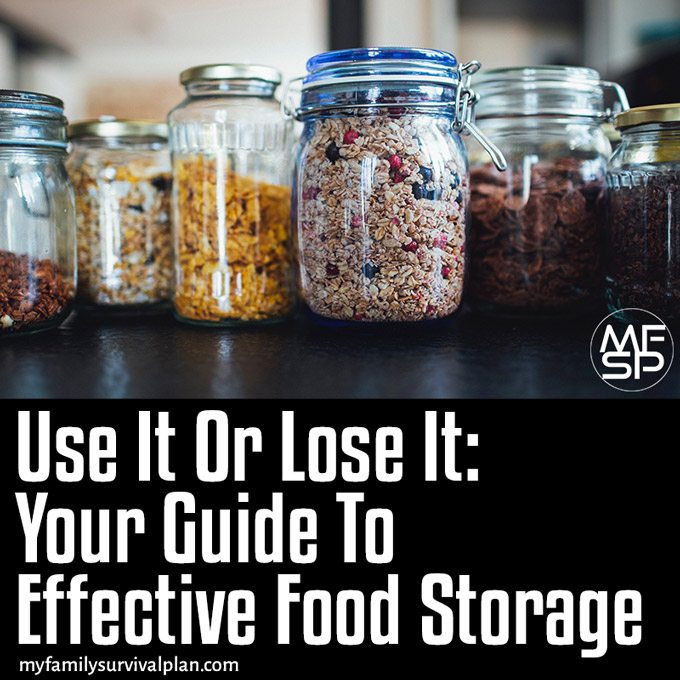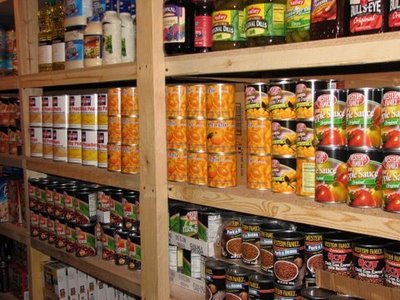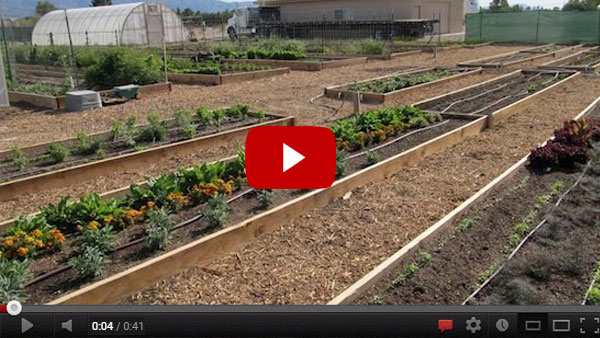Click Here To Join Our Telegram Channel for FREE daily tutorials!

Use It Or Lose It: Your Guide To Effective Food Storage Strategies And Techniques – Graphic © myfamilysurvivalplan.com. Background photo: Pexels (PD)
Like medicines and fuel, the food you have in your stockpile comes with a finite shelf life, which means that you need to implement a safe, easy, and effective system for maintaining your food storage in an economical way. After all, nobody wants to get sick–especially in the context of an SHTF scenario. But groceries are expensive, so tossing your stockpile and starting over every few months isn’t exactly practical, either. Luckily, there are some easy ways to keep your budget, your storage levels, and your body all happy.
Be Shelf Life Savvy
One of the most vital aspects of an effective food storage system is a basic understanding of the various shelf lives and expiration dates of common foods. For example, things like honey, salt, rice, and vinegar all have a shelf life that can be measured in decades instead of years, whereas fresh fruits and vegetables will last a couple of months in the freezer. Print out a simple cheat sheet to common shelf lives, and keep it in the fridge or pantry door to help keep yourself organized.
When Good Food Goes Bad
Shelf life is affected by oxygen, fat, moisture, heat, and time. The more fat a food contains and the longer it is exposed to oxygen, moisture and heat, the faster it will spoil. In fact, the shelf life of some long-lasting products, like powdered milk, will vary depending on the amount of fat they contain. Once food starts to go bad, it loses nutritional value, changes flavor, odor, and becomes rancid. Food can also lose shelf life if it’s stored in an exceedingly cold temperature and you’re left with what is commonly referred to as freezer burn.
The more fat a food contains and the longer it is exposed to oxygen, moisture and heat, the faster it will spoil. In fact, the shelf life of some long-lasting products, like powdered milk, will vary depending on the amount of fat they contain. Once food starts to go bad, it loses nutritional value, changes flavor, odor, and becomes rancid. Food can also lose shelf life if it’s stored in an exceedingly cold temperature and you’re left with what is commonly referred to as freezer burn.
Determining Shelf Life
Understanding how long aliments last after they have been opened can be confusing, so let’s examine what one needs to know when trying to figure out a product’s shelf life.
Keep in mind that almost every food has unopened and opened freshness. Unopened products usually last longer, though this does not apply to meat, which lasts longer when cooked.
Most foods have a “best before” date that usually refers to its unopened state. Such information clearly indicates when a food will start to lose its quality. If a food states an unspecific unopened expiration date and an opened expiration date, the product in question should never exceed the unopened date.
In other words, if the information on a jar of mayo states that it can last six months before being unopened and one month after being opened, one should never wait six months before opening the product thinking there’s some sort of bonus added after the food in question has been opened.
Meats & Alternatives
| Item | Refrigerated | Frozen |
| Eggs | 4 to 5 weeks | — |
| Fish | 1 to 2 days | 4 to 6 months |
| Ground Meat | 1 to 2 days | 3 to 4 months |
| Poultry | 1 to 2 days | 12 months |
| Steak | 3 to 5 days | 6 to 8 months |
Dairy Products
| Item | Refrigerated |
| Cheddar | 3 to 6 months |
| Cottage | 2 weeks |
| Grated Parmesan | 12 months |
| Swiss | 3 to 6 months |
| Processed American | 8 months |
Breads & Cereals
| Item | Shelf Life |
| Crackers | 3 months |
| Plain Bread | 15 days |
| Oatmeal | 12 months |
| Instant Cereal | 2 to 3 months |
| Pasta | 24 months |
| White Rice | 24 months |
| Brown Rice | 6 months |
Fruits & Vegetables
| Item | Shelf Life |
| Bananas | 3 to 6 days |
| Apples | 6 months |
| Onions | 2 weeks |
| Potatoes | 4 weeks |
Condiments & Dressings
| Item | Refrigerated |
| Yellow Mustard | 6 to 8 months |
| Ketchup | 24 months |
| Mayonnaise | 3 to 4 months |
| Jams & Jellies | 18 months |
| Salad Dressings | 3 months |
FIFO and GIGO
There are two essential acronyms when it comes to food storage. FIFO–First In, First Out–refers to the fact that the first items you purchase should be the first to be consumed. Many people make the mistake of keeping their preparedness food completely separate from their regular groceries. Incorporate your stockpile into your menu planning, especially as things get closer to their expiration date. Instead of, for example, buying coffee for your kitchen, replace the coffee from your stockpile and then use the cans you have in storage for your everyday needs. This is where an effective and clear labeling system comes in. Date things clearly, and pencil in a projected expiration date on your bulk, canned, and dry goods. You can even find several quality smartphone and computer apps that will help you catalog and inventory what you have and when it needs to be replaced.
The other important acronym (GIGO) stands for Garbage In, Garbage Out. In other words, stocking up on expired or nearly expired foods, sub-standard fare, or products with questionable nutritional value simply because they’re on sale is not only a bad idea but can be downright dangerous to your health and detrimental to your survival plan.
Rotation, Rotation, Rotation
Hands down, the single most important factor for keeping a well-stocked and healthy food stockpile is implementing an effective rotation plan. In addition to keeping accurate inventories and knowing your upcoming expiration dates, put the FIFO method into effect by having a uniform storage system. Lazy Susans, revolving storage shelves, or even large plastic bins on rolling pallets can all help you move things forward on a regular basis. Remember that invisible food is food that will go bad before you get a chance to use it, so keep everything well-organized and carefully cataloged.
It’s also important that you get your family to help you commit to the restocking and rotation process. That may mean implementing a system on grocery, harvest, or canning days that allows everyone to work together to rotate older inventory and restock storage shelves.
Optimize Food Longevity
There are also simple steps you can take to ensure your food items last as long as ideally possible:
• Keep food away from sunlight
• Store things in dry, cool places (very important)
• Remember that salted products, like butter, last longer (salt is a preservative, together with vinegar, lime, soya sauce)
• Brown rice spoils faster than white rice (!)
• Eggs should not be stored on refrigerator doors because doors are always warmer than the inside of the fridge
• Refrigerate bread to increase shelf life
• Bananas should be refrigerated after they have ripened (if placed before, they may not be able to resume the ripening process even if they are returned to room temperature)
• Even though some foods like peanut butter don’t indicate that they should be refrigerated, storing them in the fridge will increase shelf life and maintain flavor
• Meat lasts longer when cooked
• Cereals and rice spoil faster when prepared
• Buy food in smaller quantities
• Tightly wrap food when storing in a freezer to prevent freezer burn
I hope that I’ve given some idea on how to better preserve food. If you have some more tips and tricks for better preservation of some products please share. We are here to learn from each other.
By Alec Deacon
This Crazy Off Grid Device Literally Makes Drinkable Water From Fresh Air:
According to NASA, the U.S. is expecting a 100-YEAR LONG MEGADROUGHT.
It's already begun. Ask the farmers in California. They know.
Every survivalist knows that water is of critical importance. You NEED an independent water source that you can count on!
As an interesting "survival rehearsal" - imagine that you turned the tap on right now and nothing came out. How long would you last?
But what if there was another water source literally hidden in plain sight. That's right, I'm talking about the atmosphere!
The amazing thing about getting water from the natural moisture in the air... is that it is ALWAYS available.
This gives you real water security!
Learn more about how to tap into "Nature's secret water reservoir" and stay hydrated when TSHTF!
Watch the video:
😳 What Tinnitus Does To Your Brain Cells (And How To Stop It)
After 47 years of studies and countless brain scans done on more than 2,400 tinnitus patients, scientists at the MIT Institute found that in a shocking 96% of cases, tinnitus was actually shrinking their brain cells.
As it turns out, tinnitus and brain health are strongly linked.
Even more interesting: The reason why top army officials are not deaf after decades of hearing machine guns, bombs going off and helicopter noises…
Is because they are using something called "the wire method", a simple protocol inspired by a classified surgery on deaf people from the 1950s...

I Can't Help Showing This Off:
If you haven't heard of Claude Davis yet do yourself a huge favor and watch this video.
One of the smartest guys I ever had the pleasure of meeting, Claude set-up a unique prepping system that changed his life forever.
I already tried it myself and let me tell... you I was completely blown away... His surprising tactics could make your life easier and give you the peace of mind you deserve.
Don't just take my word for it... watch his short video and decide for yourself.

Most People Don't Have The Guts To Try This:
An amazing discovery in an abandoned house in Austin, Texas: A lost book of amazing survival knowledge, believed to have been long vanished to history, has been found in a dusty drawer in the house which belonged to a guy named Claude Davis.
Remember... back in those days, there was no electricity... no refrigerators... no law enforcement... and certainly no grocery store or supermarkets... Some of these exceptional skills are hundreds of years of old and they were learned the hard way by the early pioneers.
>> Click here to find out about them now
We've lost to history so much survival knowledge that we've become clueless compared to what our great grandfathers did or built on a daily basis to sustain their families.
Neighbors said that for the last couple of years Claude has tried to unearth and learn the forgotten ways of our great-grandparents and claimed to have found a secret of gargantuan proportions. A secret that he is about to reveal together with 3 old teachings that will change everything you think you know about preparedness:
>>> Click Here To Watch His Short Video <<<

More Off-Grid And Survival Resources:

What REALLY Happens When You Bury a Shipping Container? (Hint: It's A Bit Crazy...)
Shipping containers are all the rage - but if you are thinking about buying one, you MUST watch this video first:
There's a general belief that if you bury a shipping container you can create an awesome root cellar / storm shelter / survival bunker.
But is a shipping container strong enough to handle the pressure?
Watch the video to see what happens:
What Really Happens When You Bury a Shipping Container? (Click To Watch Video)








